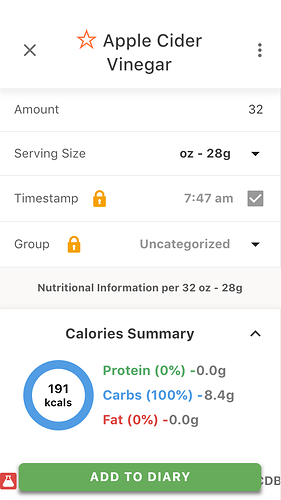…you add it to a cooked dish? Just to vary things a little, and because I don’t like ACV raw, I started adding a dash to my cooked meals just before finishing. Tastes good but will the heat affect the good properties of ACV?
What happens to apple cider vinegar if
Loads of recipes online use it as an ingredient so I’ll guess that means it’s OK.
It’s a good question, because vinegar is both an acid and a fat. I suppose it depends on whether the vinegar is included in the recipe for taste only, or to react with some other ingredient. (For example, an acid and a base are often included in batters to provide leavening in the absence of yeast.)
It supposedly also has bacteria (aka “probiotics”) (and yeast) in it, which would be killed. Some say that’s not bad.
Interesting Paul, can you explain how vinegar would be considered a fat since fat content isn’t part of vinegar? 
Acetic acid, the main component of vinegar after the water, is technically a saturated fat. This is a little-known fact that startled me when I learned it on these forums.
The chemical formula of acetic acid (CH3CO2H) meets the technical definition of a fat. Naturally occurring fatty acids have an unbranched chain of carbon atoms, with a carboxyl group (–COOH) at one end, and a methyl group (CH3-) at the other. Acetic acid is a carboxyl group joined to a methyl group, with no aliphatic groups in between. Therefore it is, technically, the shortest of the short-chain fatty acids.
Well I did find this: https://www.popsugar.com/fitness/Can-Apple-Cider-Vinegar-Heated-44793475
I believe that the amino acids present in ACV are not destroyed by boiling.
Indeed is is the technically the shortest of fatty acid chains but I found some reference to it generally not considered a fatty acid because it’s too strong of a ph and generally fatty acids are less corrosive. Butyrate is the shortest chain that’s generally referred to as a fatty acid that can fuel your body. Although ACV does help metabolize body fat it doesn’t supply the fatty acids we us as fuel. Even with the amount of a full quart of ACV with the most conservative estimates of carb content (most claim zero) from Cronometer is pretty insignificant in caloric energy. I don’t believe vinegar can possibly be significant fuel source in our body as a fatty acid, all the energy we can get from vinegar is from the trace carbohydrates that may be present. I looked pretty long with a search engine to find any possible reference to vinegar being a significant fuel source and found ZILCH.
@cooked ACV contains zero amino acid content, it’s made from apple juice which has zero protein content. 
I’d assume it may kill the bacteria in it assuming you’re using the raw stuff. I’m a big fan of ACV, but honestly don’t think it’s so miraculous that you should even bother if you don’t like the taste of it. I feel many people have given the MCT Oil status to ACV, where people are going out of their way to stick it in everything.
As I wrote, while acetic acid is technically a fat, that’s not how we use it. The reverse is true of the β-hydroxybutyrate produced during ketogenesis: it is not technically a ketone, but we treat it as one (which is why the term “ketone body” was devised). Thanks for your excellent info, David.

